Waste Management Policies in Developing Countries: Liberia vs. UK
VerifiedAdded on 2021/02/22
|35
|14645
|327
Report
AI Summary
This report provides a comprehensive comparative analysis of waste management policies, focusing on the contrasting approaches of Liberia and the United Kingdom. The study begins with an introduction to the significance of waste management, its historical context, and the various types of waste management policies. It highlights the importance of effective waste management for public health, environmental sustainability, and the mitigation of climate hazards. The report then delves into the specific waste management challenges faced by the UK, a developed nation, and Liberia, a developing country, considering factors such as population growth, industrialization, and resource constraints. The research methodology involves the use of secondary data and explores research questions related to waste composition, extraction techniques, and policy development. The findings underscore the urgent need for both developed and developing nations to formulate and implement sustainable waste management policies. The report also includes a literature review and discussion sections that provide insights into the current state of waste management practices, challenges, and potential solutions, emphasizing the importance of policy formulation and implementation for creating a green and healthy environment. The report concludes with a discussion of the research questions and objectives. The report is available on Desklib.
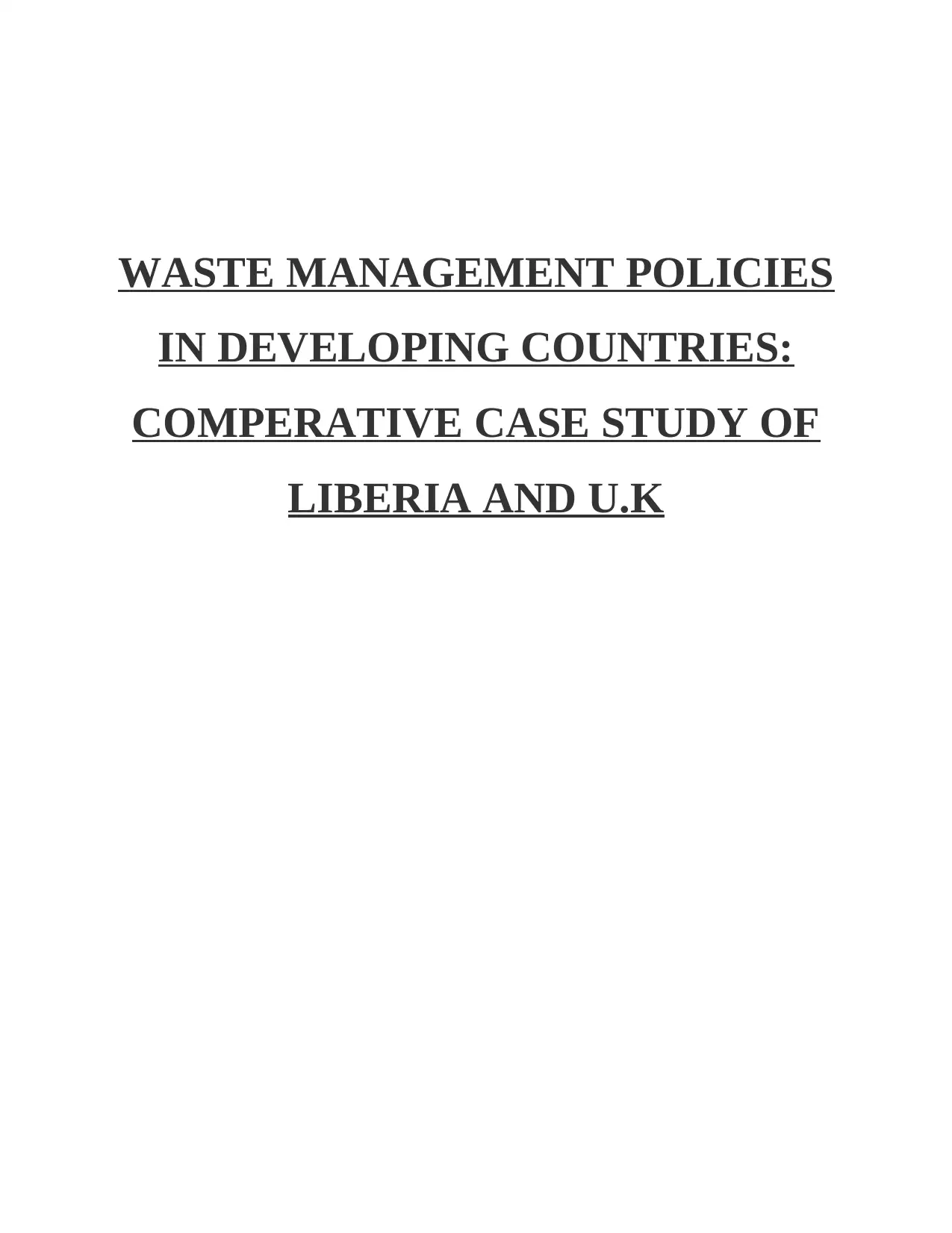
WASTE MANAGEMENT POLICIES
IN DEVELOPING COUNTRIES:
COMPERATIVE CASE STUDY OF
LIBERIA AND U.K
IN DEVELOPING COUNTRIES:
COMPERATIVE CASE STUDY OF
LIBERIA AND U.K
Paraphrase This Document
Need a fresh take? Get an instant paraphrase of this document with our AI Paraphraser
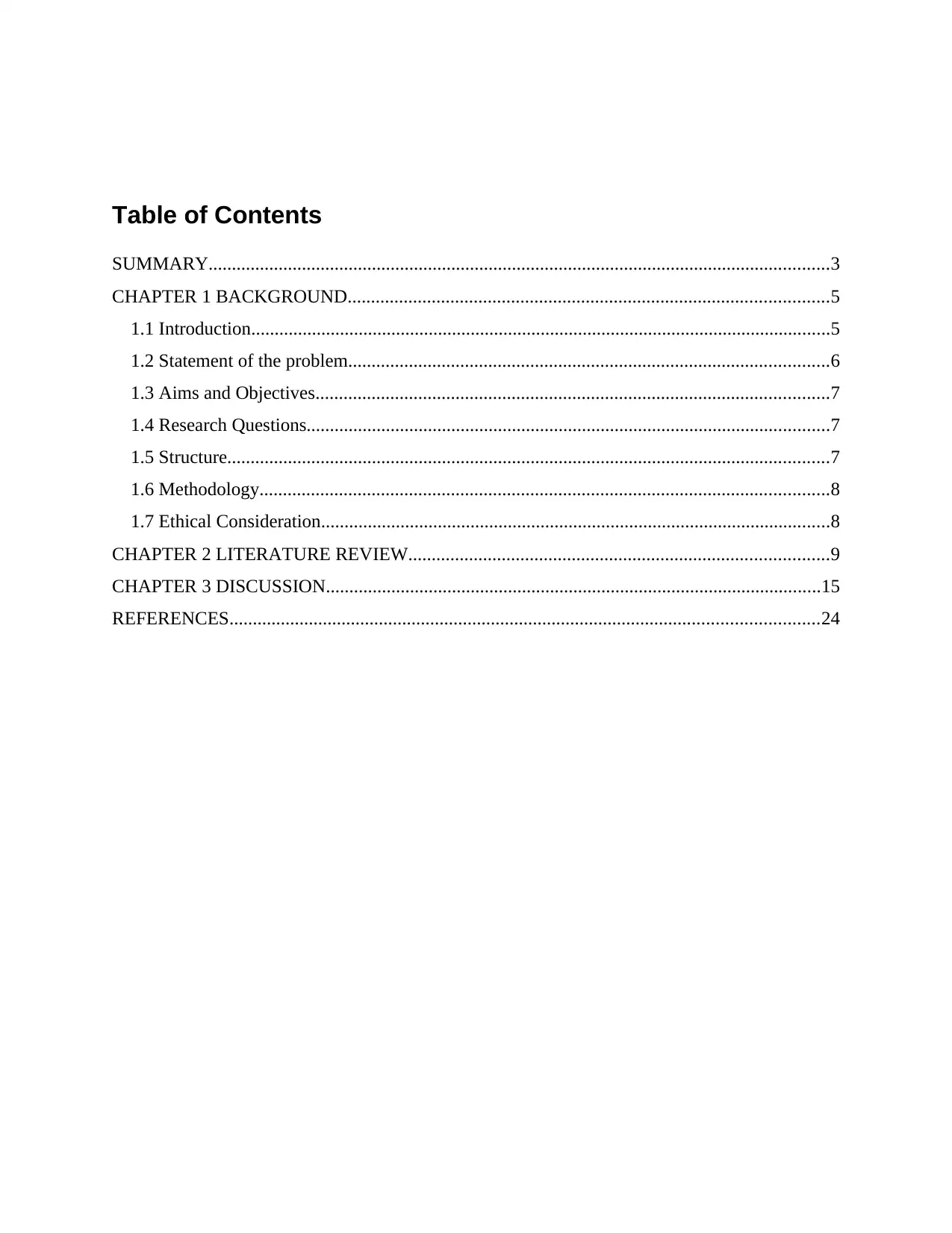
Table of Contents
SUMMARY.....................................................................................................................................3
CHAPTER 1 BACKGROUND.......................................................................................................5
1.1 Introduction............................................................................................................................5
1.2 Statement of the problem.......................................................................................................6
1.3 Aims and Objectives..............................................................................................................7
1.4 Research Questions................................................................................................................7
1.5 Structure.................................................................................................................................7
1.6 Methodology..........................................................................................................................8
1.7 Ethical Consideration.............................................................................................................8
CHAPTER 2 LITERATURE REVIEW..........................................................................................9
CHAPTER 3 DISCUSSION..........................................................................................................15
REFERENCES..............................................................................................................................24
SUMMARY.....................................................................................................................................3
CHAPTER 1 BACKGROUND.......................................................................................................5
1.1 Introduction............................................................................................................................5
1.2 Statement of the problem.......................................................................................................6
1.3 Aims and Objectives..............................................................................................................7
1.4 Research Questions................................................................................................................7
1.5 Structure.................................................................................................................................7
1.6 Methodology..........................................................................................................................8
1.7 Ethical Consideration.............................................................................................................8
CHAPTER 2 LITERATURE REVIEW..........................................................................................9
CHAPTER 3 DISCUSSION..........................................................................................................15
REFERENCES..............................................................................................................................24
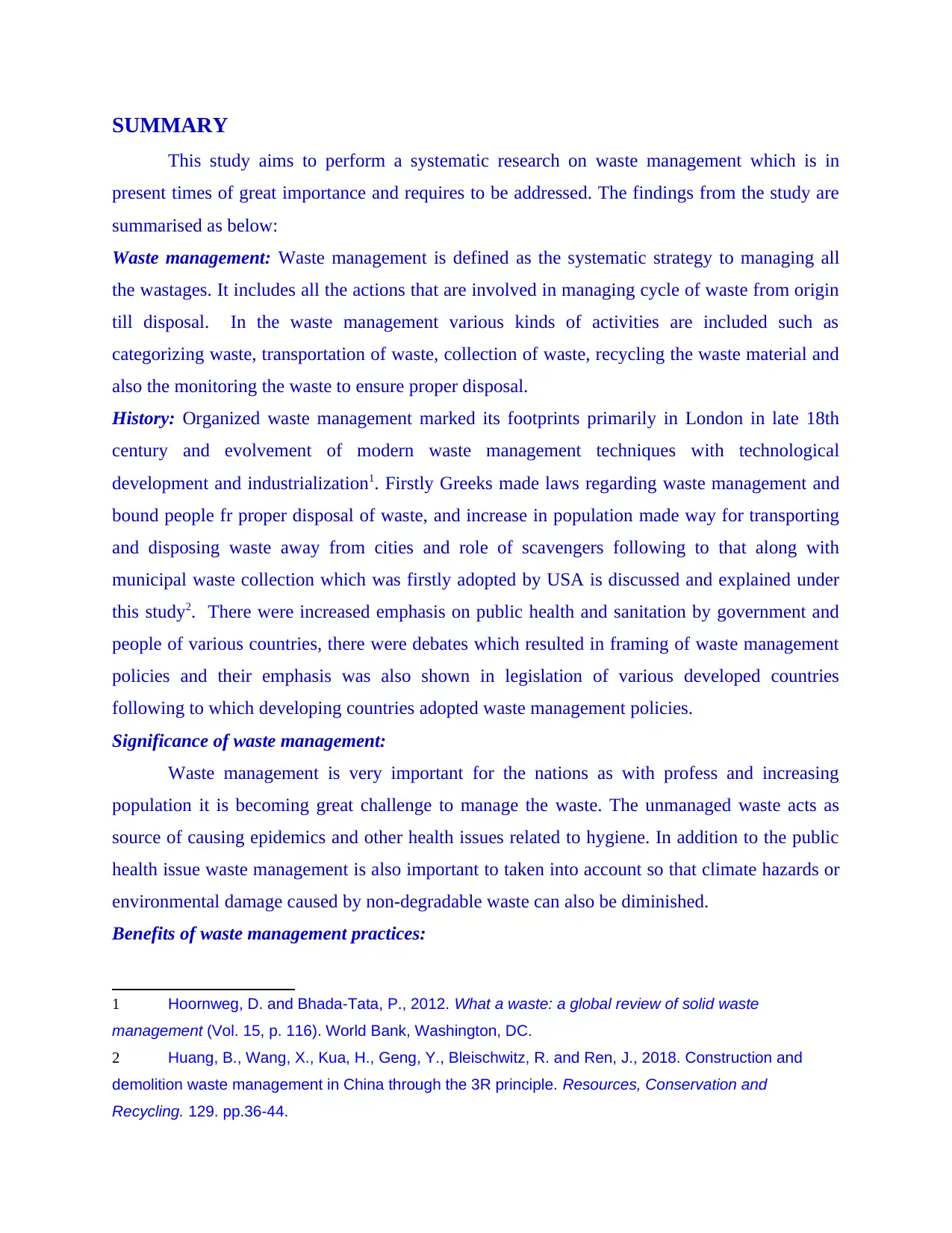
SUMMARY
This study aims to perform a systematic research on waste management which is in
present times of great importance and requires to be addressed. The findings from the study are
summarised as below:
Waste management: Waste management is defined as the systematic strategy to managing all
the wastages. It includes all the actions that are involved in managing cycle of waste from origin
till disposal. In the waste management various kinds of activities are included such as
categorizing waste, transportation of waste, collection of waste, recycling the waste material and
also the monitoring the waste to ensure proper disposal.
History: Organized waste management marked its footprints primarily in London in late 18th
century and evolvement of modern waste management techniques with technological
development and industrialization1. Firstly Greeks made laws regarding waste management and
bound people fr proper disposal of waste, and increase in population made way for transporting
and disposing waste away from cities and role of scavengers following to that along with
municipal waste collection which was firstly adopted by USA is discussed and explained under
this study2. There were increased emphasis on public health and sanitation by government and
people of various countries, there were debates which resulted in framing of waste management
policies and their emphasis was also shown in legislation of various developed countries
following to which developing countries adopted waste management policies.
Significance of waste management:
Waste management is very important for the nations as with profess and increasing
population it is becoming great challenge to manage the waste. The unmanaged waste acts as
source of causing epidemics and other health issues related to hygiene. In addition to the public
health issue waste management is also important to taken into account so that climate hazards or
environmental damage caused by non-degradable waste can also be diminished.
Benefits of waste management practices:
1 Hoornweg, D. and Bhada-Tata, P., 2012. What a waste: a global review of solid waste
management (Vol. 15, p. 116). World Bank, Washington, DC.
2 Huang, B., Wang, X., Kua, H., Geng, Y., Bleischwitz, R. and Ren, J., 2018. Construction and
demolition waste management in China through the 3R principle. Resources, Conservation and
Recycling. 129. pp.36-44.
This study aims to perform a systematic research on waste management which is in
present times of great importance and requires to be addressed. The findings from the study are
summarised as below:
Waste management: Waste management is defined as the systematic strategy to managing all
the wastages. It includes all the actions that are involved in managing cycle of waste from origin
till disposal. In the waste management various kinds of activities are included such as
categorizing waste, transportation of waste, collection of waste, recycling the waste material and
also the monitoring the waste to ensure proper disposal.
History: Organized waste management marked its footprints primarily in London in late 18th
century and evolvement of modern waste management techniques with technological
development and industrialization1. Firstly Greeks made laws regarding waste management and
bound people fr proper disposal of waste, and increase in population made way for transporting
and disposing waste away from cities and role of scavengers following to that along with
municipal waste collection which was firstly adopted by USA is discussed and explained under
this study2. There were increased emphasis on public health and sanitation by government and
people of various countries, there were debates which resulted in framing of waste management
policies and their emphasis was also shown in legislation of various developed countries
following to which developing countries adopted waste management policies.
Significance of waste management:
Waste management is very important for the nations as with profess and increasing
population it is becoming great challenge to manage the waste. The unmanaged waste acts as
source of causing epidemics and other health issues related to hygiene. In addition to the public
health issue waste management is also important to taken into account so that climate hazards or
environmental damage caused by non-degradable waste can also be diminished.
Benefits of waste management practices:
1 Hoornweg, D. and Bhada-Tata, P., 2012. What a waste: a global review of solid waste
management (Vol. 15, p. 116). World Bank, Washington, DC.
2 Huang, B., Wang, X., Kua, H., Geng, Y., Bleischwitz, R. and Ren, J., 2018. Construction and
demolition waste management in China through the 3R principle. Resources, Conservation and
Recycling. 129. pp.36-44.
⊘ This is a preview!⊘
Do you want full access?
Subscribe today to unlock all pages.

Trusted by 1+ million students worldwide
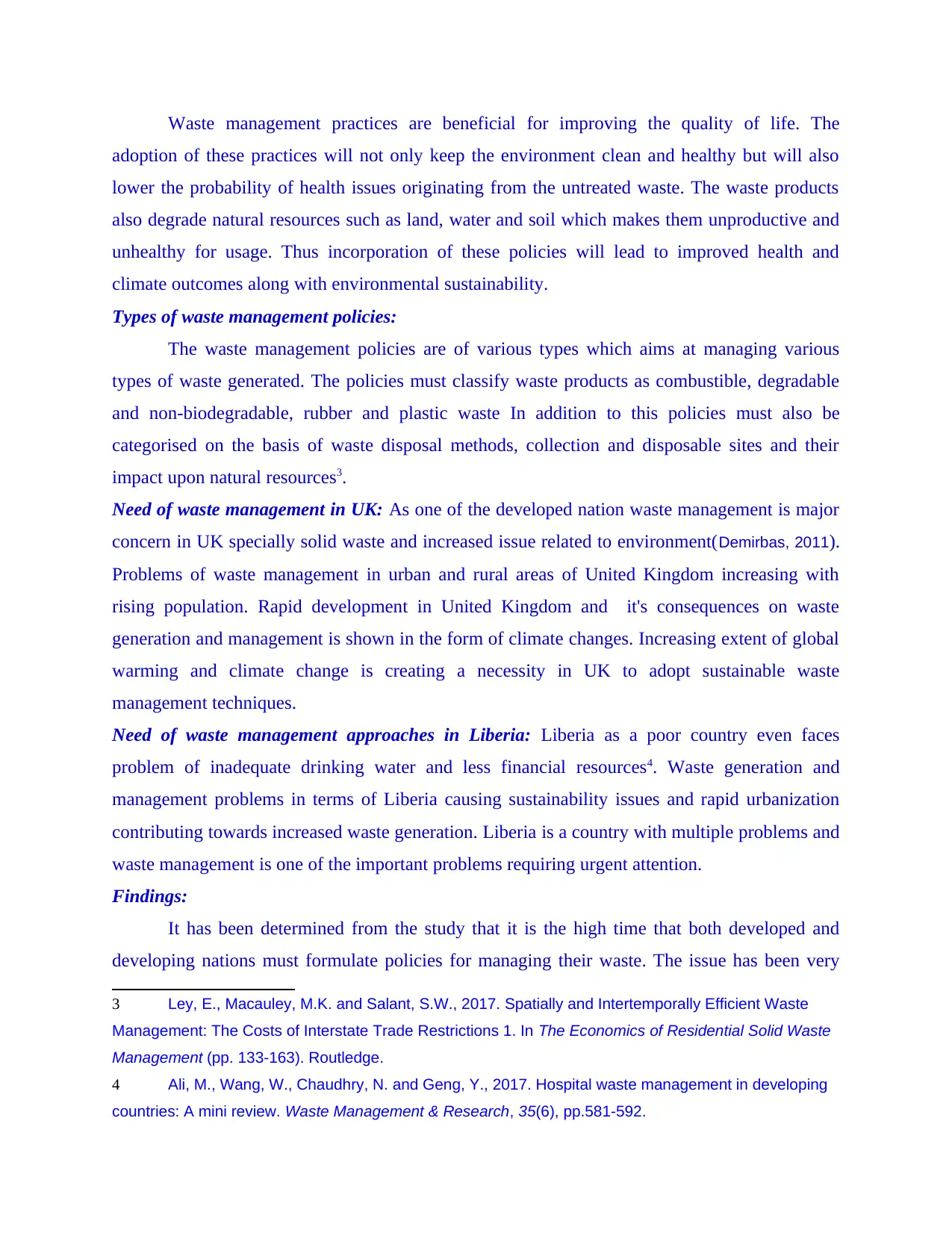
Waste management practices are beneficial for improving the quality of life. The
adoption of these practices will not only keep the environment clean and healthy but will also
lower the probability of health issues originating from the untreated waste. The waste products
also degrade natural resources such as land, water and soil which makes them unproductive and
unhealthy for usage. Thus incorporation of these policies will lead to improved health and
climate outcomes along with environmental sustainability.
Types of waste management policies:
The waste management policies are of various types which aims at managing various
types of waste generated. The policies must classify waste products as combustible, degradable
and non-biodegradable, rubber and plastic waste In addition to this policies must also be
categorised on the basis of waste disposal methods, collection and disposable sites and their
impact upon natural resources3.
Need of waste management in UK: As one of the developed nation waste management is major
concern in UK specially solid waste and increased issue related to environment(Demirbas, 2011).
Problems of waste management in urban and rural areas of United Kingdom increasing with
rising population. Rapid development in United Kingdom and it's consequences on waste
generation and management is shown in the form of climate changes. Increasing extent of global
warming and climate change is creating a necessity in UK to adopt sustainable waste
management techniques.
Need of waste management approaches in Liberia: Liberia as a poor country even faces
problem of inadequate drinking water and less financial resources4. Waste generation and
management problems in terms of Liberia causing sustainability issues and rapid urbanization
contributing towards increased waste generation. Liberia is a country with multiple problems and
waste management is one of the important problems requiring urgent attention.
Findings:
It has been determined from the study that it is the high time that both developed and
developing nations must formulate policies for managing their waste. The issue has been very
3 Ley, E., Macauley, M.K. and Salant, S.W., 2017. Spatially and Intertemporally Efficient Waste
Management: The Costs of Interstate Trade Restrictions 1. In The Economics of Residential Solid Waste
Management (pp. 133-163). Routledge.
4 Ali, M., Wang, W., Chaudhry, N. and Geng, Y., 2017. Hospital waste management in developing
countries: A mini review. Waste Management & Research, 35(6), pp.581-592.
adoption of these practices will not only keep the environment clean and healthy but will also
lower the probability of health issues originating from the untreated waste. The waste products
also degrade natural resources such as land, water and soil which makes them unproductive and
unhealthy for usage. Thus incorporation of these policies will lead to improved health and
climate outcomes along with environmental sustainability.
Types of waste management policies:
The waste management policies are of various types which aims at managing various
types of waste generated. The policies must classify waste products as combustible, degradable
and non-biodegradable, rubber and plastic waste In addition to this policies must also be
categorised on the basis of waste disposal methods, collection and disposable sites and their
impact upon natural resources3.
Need of waste management in UK: As one of the developed nation waste management is major
concern in UK specially solid waste and increased issue related to environment(Demirbas, 2011).
Problems of waste management in urban and rural areas of United Kingdom increasing with
rising population. Rapid development in United Kingdom and it's consequences on waste
generation and management is shown in the form of climate changes. Increasing extent of global
warming and climate change is creating a necessity in UK to adopt sustainable waste
management techniques.
Need of waste management approaches in Liberia: Liberia as a poor country even faces
problem of inadequate drinking water and less financial resources4. Waste generation and
management problems in terms of Liberia causing sustainability issues and rapid urbanization
contributing towards increased waste generation. Liberia is a country with multiple problems and
waste management is one of the important problems requiring urgent attention.
Findings:
It has been determined from the study that it is the high time that both developed and
developing nations must formulate policies for managing their waste. The issue has been very
3 Ley, E., Macauley, M.K. and Salant, S.W., 2017. Spatially and Intertemporally Efficient Waste
Management: The Costs of Interstate Trade Restrictions 1. In The Economics of Residential Solid Waste
Management (pp. 133-163). Routledge.
4 Ali, M., Wang, W., Chaudhry, N. and Geng, Y., 2017. Hospital waste management in developing
countries: A mini review. Waste Management & Research, 35(6), pp.581-592.
Paraphrase This Document
Need a fresh take? Get an instant paraphrase of this document with our AI Paraphraser
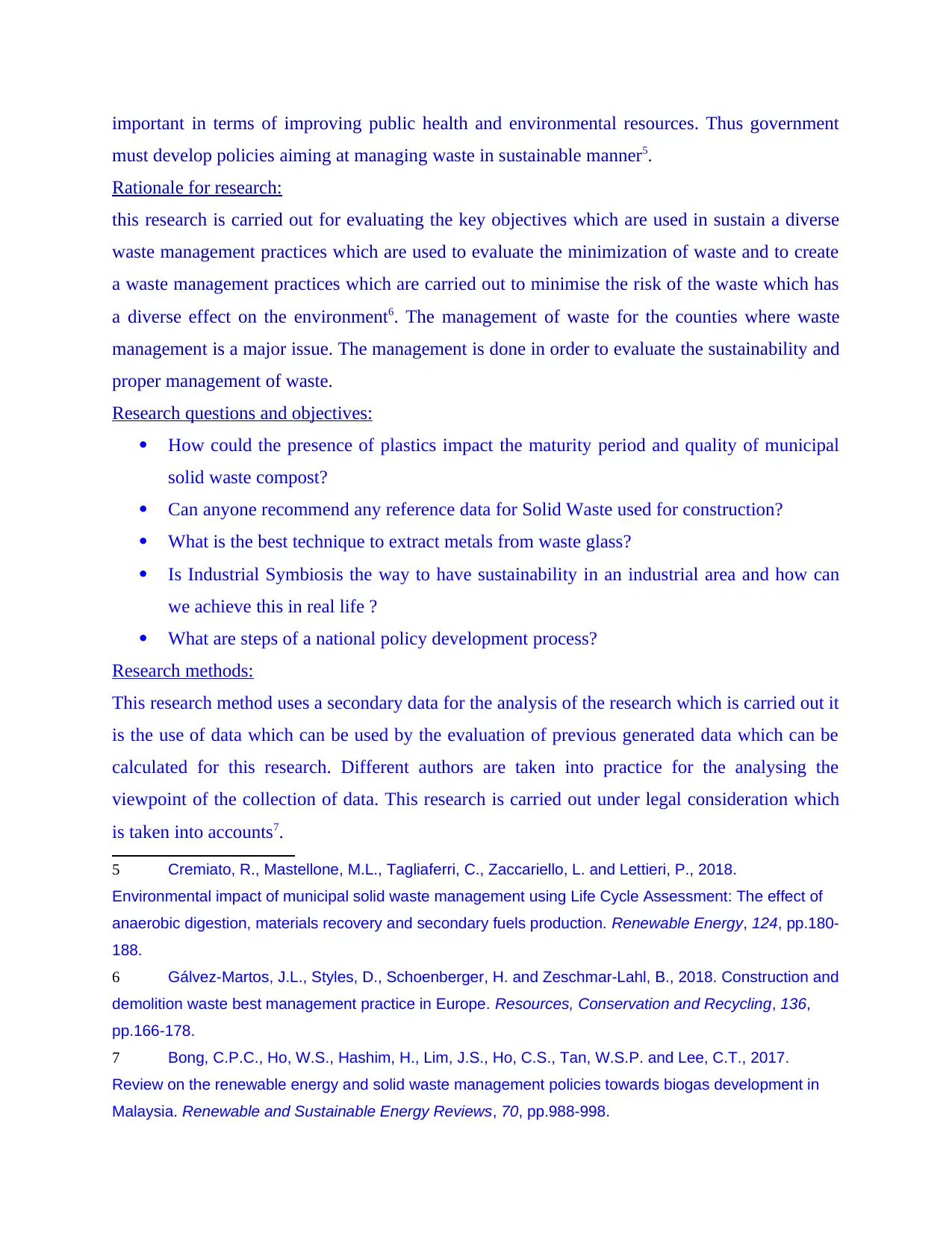
important in terms of improving public health and environmental resources. Thus government
must develop policies aiming at managing waste in sustainable manner5.
Rationale for research:
this research is carried out for evaluating the key objectives which are used in sustain a diverse
waste management practices which are used to evaluate the minimization of waste and to create
a waste management practices which are carried out to minimise the risk of the waste which has
a diverse effect on the environment6. The management of waste for the counties where waste
management is a major issue. The management is done in order to evaluate the sustainability and
proper management of waste.
Research questions and objectives:
How could the presence of plastics impact the maturity period and quality of municipal
solid waste compost?
Can anyone recommend any reference data for Solid Waste used for construction?
What is the best technique to extract metals from waste glass?
Is Industrial Symbiosis the way to have sustainability in an industrial area and how can
we achieve this in real life ?
What are steps of a national policy development process?
Research methods:
This research method uses a secondary data for the analysis of the research which is carried out it
is the use of data which can be used by the evaluation of previous generated data which can be
calculated for this research. Different authors are taken into practice for the analysing the
viewpoint of the collection of data. This research is carried out under legal consideration which
is taken into accounts7.
5 Cremiato, R., Mastellone, M.L., Tagliaferri, C., Zaccariello, L. and Lettieri, P., 2018.
Environmental impact of municipal solid waste management using Life Cycle Assessment: The effect of
anaerobic digestion, materials recovery and secondary fuels production. Renewable Energy, 124, pp.180-
188.
6 Gálvez-Martos, J.L., Styles, D., Schoenberger, H. and Zeschmar-Lahl, B., 2018. Construction and
demolition waste best management practice in Europe. Resources, Conservation and Recycling, 136,
pp.166-178.
7 Bong, C.P.C., Ho, W.S., Hashim, H., Lim, J.S., Ho, C.S., Tan, W.S.P. and Lee, C.T., 2017.
Review on the renewable energy and solid waste management policies towards biogas development in
Malaysia. Renewable and Sustainable Energy Reviews, 70, pp.988-998.
must develop policies aiming at managing waste in sustainable manner5.
Rationale for research:
this research is carried out for evaluating the key objectives which are used in sustain a diverse
waste management practices which are used to evaluate the minimization of waste and to create
a waste management practices which are carried out to minimise the risk of the waste which has
a diverse effect on the environment6. The management of waste for the counties where waste
management is a major issue. The management is done in order to evaluate the sustainability and
proper management of waste.
Research questions and objectives:
How could the presence of plastics impact the maturity period and quality of municipal
solid waste compost?
Can anyone recommend any reference data for Solid Waste used for construction?
What is the best technique to extract metals from waste glass?
Is Industrial Symbiosis the way to have sustainability in an industrial area and how can
we achieve this in real life ?
What are steps of a national policy development process?
Research methods:
This research method uses a secondary data for the analysis of the research which is carried out it
is the use of data which can be used by the evaluation of previous generated data which can be
calculated for this research. Different authors are taken into practice for the analysing the
viewpoint of the collection of data. This research is carried out under legal consideration which
is taken into accounts7.
5 Cremiato, R., Mastellone, M.L., Tagliaferri, C., Zaccariello, L. and Lettieri, P., 2018.
Environmental impact of municipal solid waste management using Life Cycle Assessment: The effect of
anaerobic digestion, materials recovery and secondary fuels production. Renewable Energy, 124, pp.180-
188.
6 Gálvez-Martos, J.L., Styles, D., Schoenberger, H. and Zeschmar-Lahl, B., 2018. Construction and
demolition waste best management practice in Europe. Resources, Conservation and Recycling, 136,
pp.166-178.
7 Bong, C.P.C., Ho, W.S., Hashim, H., Lim, J.S., Ho, C.S., Tan, W.S.P. and Lee, C.T., 2017.
Review on the renewable energy and solid waste management policies towards biogas development in
Malaysia. Renewable and Sustainable Energy Reviews, 70, pp.988-998.
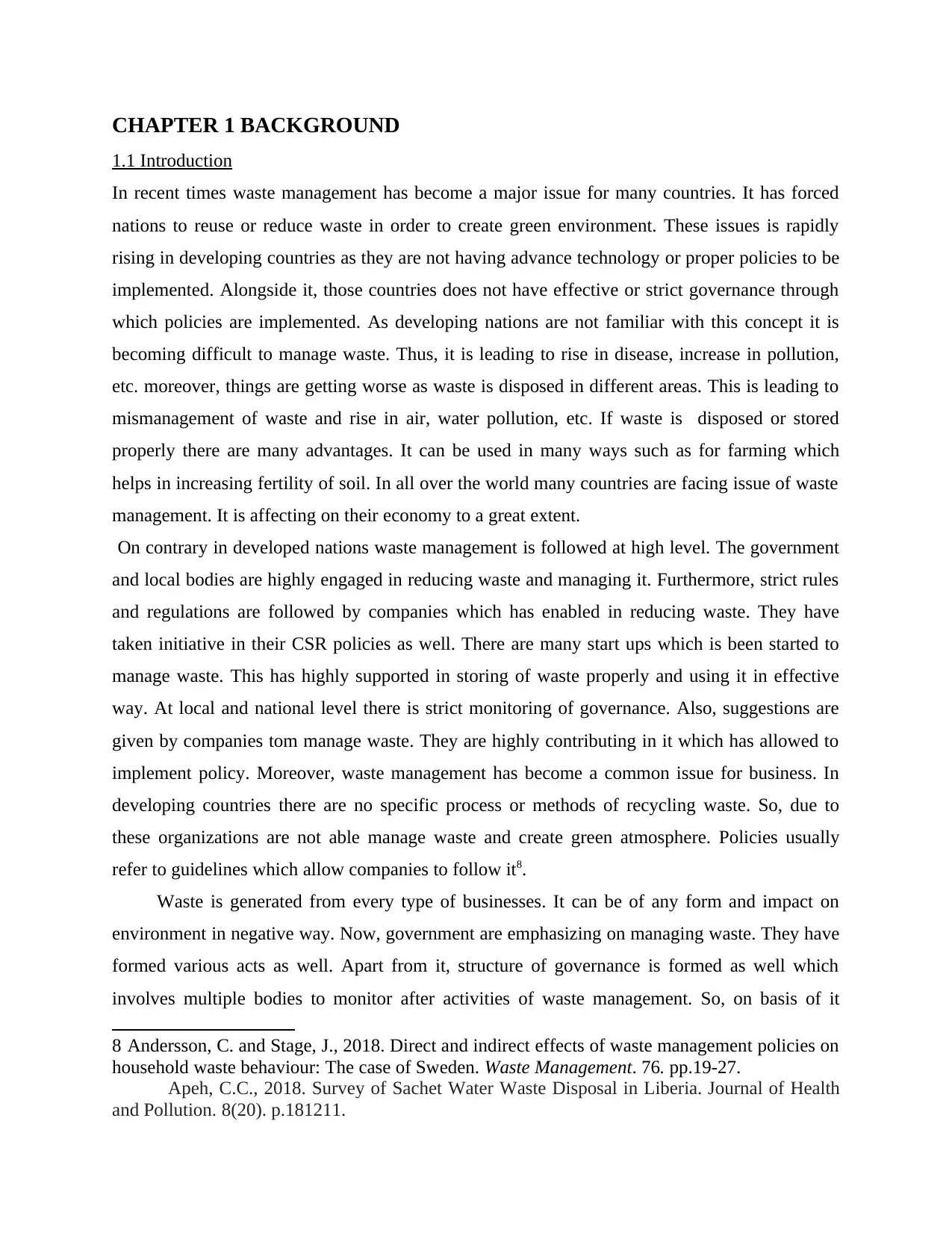
CHAPTER 1 BACKGROUND
1.1 Introduction
In recent times waste management has become a major issue for many countries. It has forced
nations to reuse or reduce waste in order to create green environment. These issues is rapidly
rising in developing countries as they are not having advance technology or proper policies to be
implemented. Alongside it, those countries does not have effective or strict governance through
which policies are implemented. As developing nations are not familiar with this concept it is
becoming difficult to manage waste. Thus, it is leading to rise in disease, increase in pollution,
etc. moreover, things are getting worse as waste is disposed in different areas. This is leading to
mismanagement of waste and rise in air, water pollution, etc. If waste is disposed or stored
properly there are many advantages. It can be used in many ways such as for farming which
helps in increasing fertility of soil. In all over the world many countries are facing issue of waste
management. It is affecting on their economy to a great extent.
On contrary in developed nations waste management is followed at high level. The government
and local bodies are highly engaged in reducing waste and managing it. Furthermore, strict rules
and regulations are followed by companies which has enabled in reducing waste. They have
taken initiative in their CSR policies as well. There are many start ups which is been started to
manage waste. This has highly supported in storing of waste properly and using it in effective
way. At local and national level there is strict monitoring of governance. Also, suggestions are
given by companies tom manage waste. They are highly contributing in it which has allowed to
implement policy. Moreover, waste management has become a common issue for business. In
developing countries there are no specific process or methods of recycling waste. So, due to
these organizations are not able manage waste and create green atmosphere. Policies usually
refer to guidelines which allow companies to follow it8.
Waste is generated from every type of businesses. It can be of any form and impact on
environment in negative way. Now, government are emphasizing on managing waste. They have
formed various acts as well. Apart from it, structure of governance is formed as well which
involves multiple bodies to monitor after activities of waste management. So, on basis of it
8 Andersson, C. and Stage, J., 2018. Direct and indirect effects of waste management policies on
household waste behaviour: The case of Sweden. Waste Management. 76. pp.19-27.
Apeh, C.C., 2018. Survey of Sachet Water Waste Disposal in Liberia. Journal of Health
and Pollution. 8(20). p.181211.
1.1 Introduction
In recent times waste management has become a major issue for many countries. It has forced
nations to reuse or reduce waste in order to create green environment. These issues is rapidly
rising in developing countries as they are not having advance technology or proper policies to be
implemented. Alongside it, those countries does not have effective or strict governance through
which policies are implemented. As developing nations are not familiar with this concept it is
becoming difficult to manage waste. Thus, it is leading to rise in disease, increase in pollution,
etc. moreover, things are getting worse as waste is disposed in different areas. This is leading to
mismanagement of waste and rise in air, water pollution, etc. If waste is disposed or stored
properly there are many advantages. It can be used in many ways such as for farming which
helps in increasing fertility of soil. In all over the world many countries are facing issue of waste
management. It is affecting on their economy to a great extent.
On contrary in developed nations waste management is followed at high level. The government
and local bodies are highly engaged in reducing waste and managing it. Furthermore, strict rules
and regulations are followed by companies which has enabled in reducing waste. They have
taken initiative in their CSR policies as well. There are many start ups which is been started to
manage waste. This has highly supported in storing of waste properly and using it in effective
way. At local and national level there is strict monitoring of governance. Also, suggestions are
given by companies tom manage waste. They are highly contributing in it which has allowed to
implement policy. Moreover, waste management has become a common issue for business. In
developing countries there are no specific process or methods of recycling waste. So, due to
these organizations are not able manage waste and create green atmosphere. Policies usually
refer to guidelines which allow companies to follow it8.
Waste is generated from every type of businesses. It can be of any form and impact on
environment in negative way. Now, government are emphasizing on managing waste. They have
formed various acts as well. Apart from it, structure of governance is formed as well which
involves multiple bodies to monitor after activities of waste management. So, on basis of it
8 Andersson, C. and Stage, J., 2018. Direct and indirect effects of waste management policies on
household waste behaviour: The case of Sweden. Waste Management. 76. pp.19-27.
Apeh, C.C., 2018. Survey of Sachet Water Waste Disposal in Liberia. Journal of Health
and Pollution. 8(20). p.181211.
⊘ This is a preview!⊘
Do you want full access?
Subscribe today to unlock all pages.

Trusted by 1+ million students worldwide
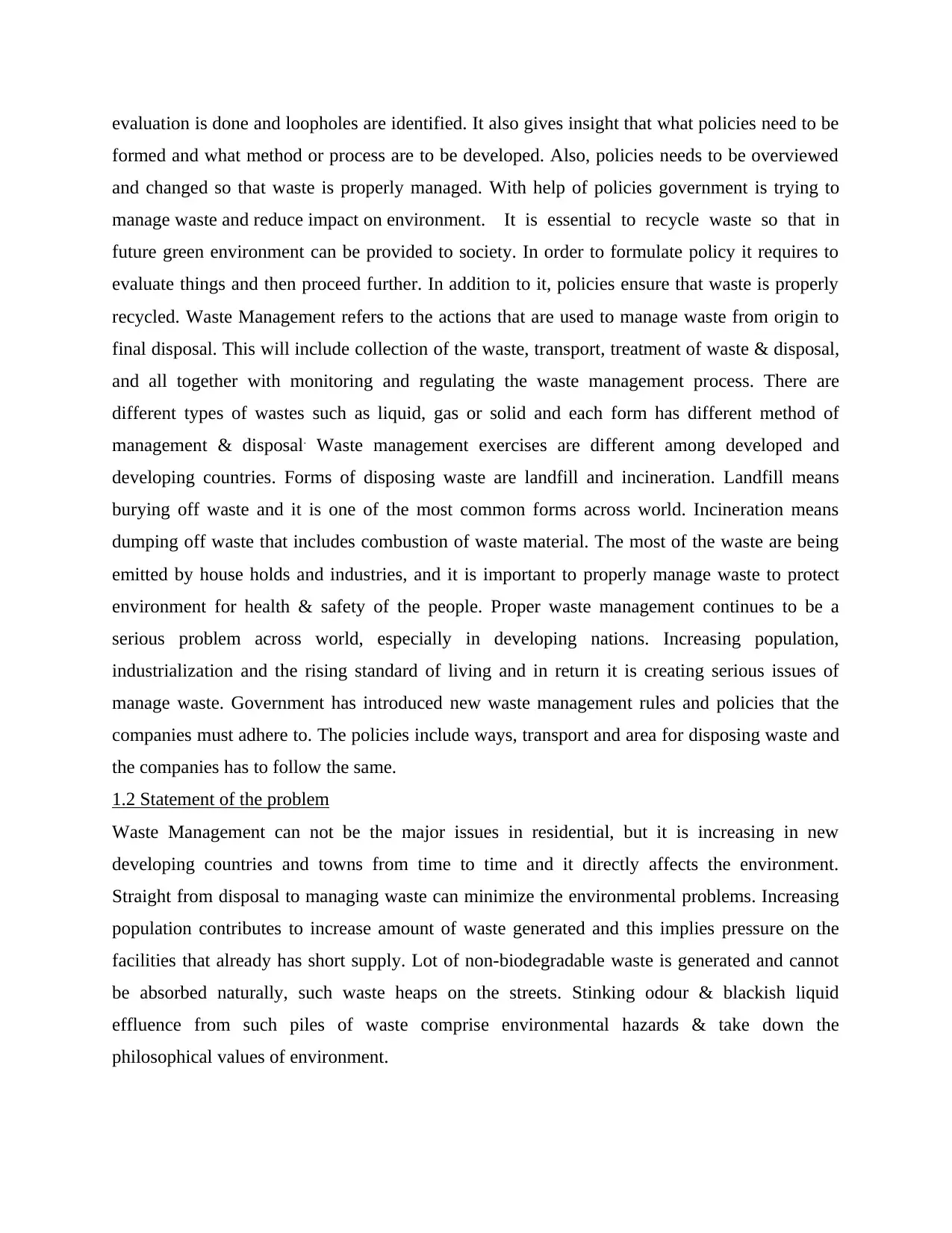
evaluation is done and loopholes are identified. It also gives insight that what policies need to be
formed and what method or process are to be developed. Also, policies needs to be overviewed
and changed so that waste is properly managed. With help of policies government is trying to
manage waste and reduce impact on environment. It is essential to recycle waste so that in
future green environment can be provided to society. In order to formulate policy it requires to
evaluate things and then proceed further. In addition to it, policies ensure that waste is properly
recycled. Waste Management refers to the actions that are used to manage waste from origin to
final disposal. This will include collection of the waste, transport, treatment of waste & disposal,
and all together with monitoring and regulating the waste management process. There are
different types of wastes such as liquid, gas or solid and each form has different method of
management & disposal. Waste management exercises are different among developed and
developing countries. Forms of disposing waste are landfill and incineration. Landfill means
burying off waste and it is one of the most common forms across world. Incineration means
dumping off waste that includes combustion of waste material. The most of the waste are being
emitted by house holds and industries, and it is important to properly manage waste to protect
environment for health & safety of the people. Proper waste management continues to be a
serious problem across world, especially in developing nations. Increasing population,
industrialization and the rising standard of living and in return it is creating serious issues of
manage waste. Government has introduced new waste management rules and policies that the
companies must adhere to. The policies include ways, transport and area for disposing waste and
the companies has to follow the same.
1.2 Statement of the problem
Waste Management can not be the major issues in residential, but it is increasing in new
developing countries and towns from time to time and it directly affects the environment.
Straight from disposal to managing waste can minimize the environmental problems. Increasing
population contributes to increase amount of waste generated and this implies pressure on the
facilities that already has short supply. Lot of non-biodegradable waste is generated and cannot
be absorbed naturally, such waste heaps on the streets. Stinking odour & blackish liquid
effluence from such piles of waste comprise environmental hazards & take down the
philosophical values of environment.
formed and what method or process are to be developed. Also, policies needs to be overviewed
and changed so that waste is properly managed. With help of policies government is trying to
manage waste and reduce impact on environment. It is essential to recycle waste so that in
future green environment can be provided to society. In order to formulate policy it requires to
evaluate things and then proceed further. In addition to it, policies ensure that waste is properly
recycled. Waste Management refers to the actions that are used to manage waste from origin to
final disposal. This will include collection of the waste, transport, treatment of waste & disposal,
and all together with monitoring and regulating the waste management process. There are
different types of wastes such as liquid, gas or solid and each form has different method of
management & disposal. Waste management exercises are different among developed and
developing countries. Forms of disposing waste are landfill and incineration. Landfill means
burying off waste and it is one of the most common forms across world. Incineration means
dumping off waste that includes combustion of waste material. The most of the waste are being
emitted by house holds and industries, and it is important to properly manage waste to protect
environment for health & safety of the people. Proper waste management continues to be a
serious problem across world, especially in developing nations. Increasing population,
industrialization and the rising standard of living and in return it is creating serious issues of
manage waste. Government has introduced new waste management rules and policies that the
companies must adhere to. The policies include ways, transport and area for disposing waste and
the companies has to follow the same.
1.2 Statement of the problem
Waste Management can not be the major issues in residential, but it is increasing in new
developing countries and towns from time to time and it directly affects the environment.
Straight from disposal to managing waste can minimize the environmental problems. Increasing
population contributes to increase amount of waste generated and this implies pressure on the
facilities that already has short supply. Lot of non-biodegradable waste is generated and cannot
be absorbed naturally, such waste heaps on the streets. Stinking odour & blackish liquid
effluence from such piles of waste comprise environmental hazards & take down the
philosophical values of environment.
Paraphrase This Document
Need a fresh take? Get an instant paraphrase of this document with our AI Paraphraser
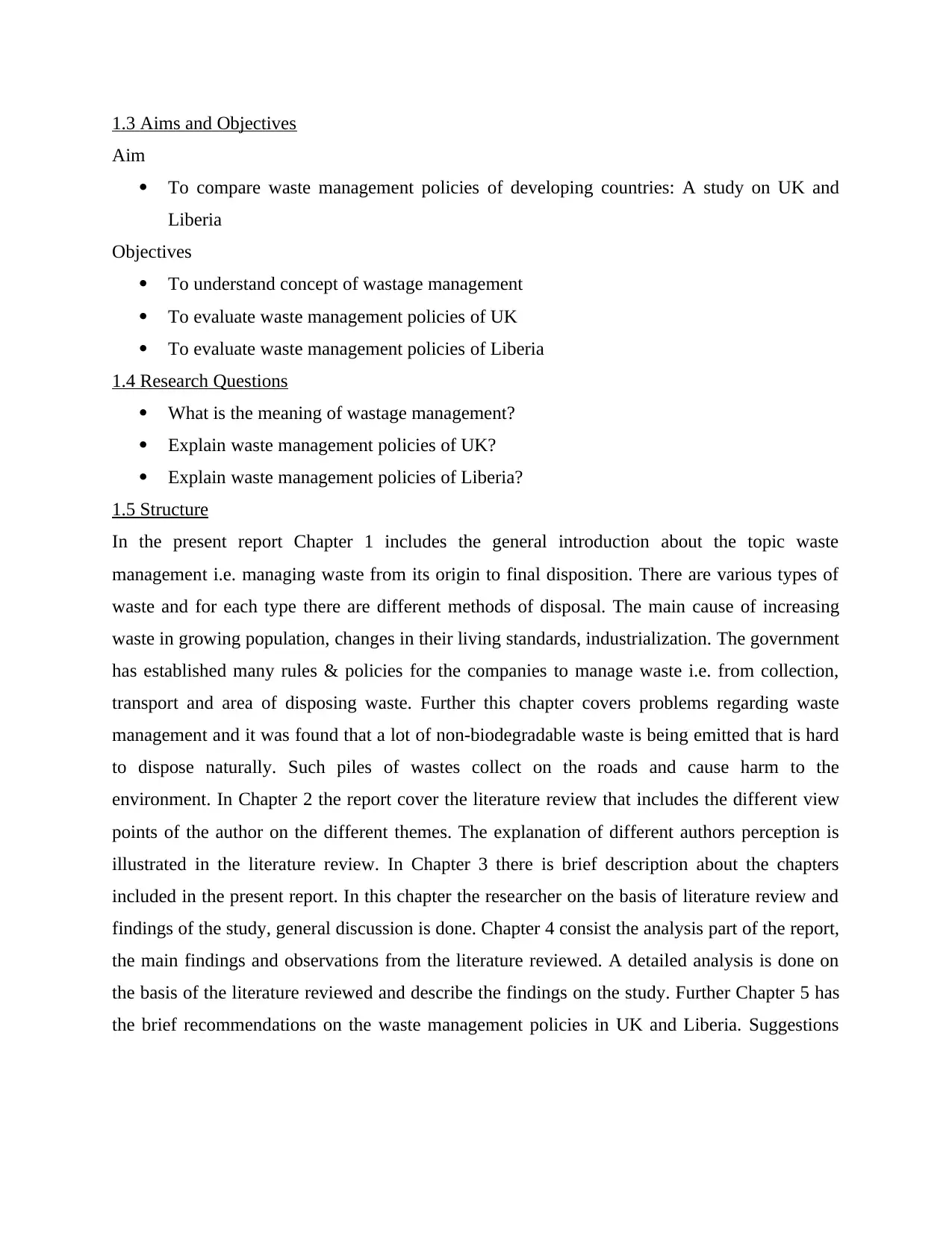
1.3 Aims and Objectives
Aim
To compare waste management policies of developing countries: A study on UK and
Liberia
Objectives
To understand concept of wastage management
To evaluate waste management policies of UK
To evaluate waste management policies of Liberia
1.4 Research Questions
What is the meaning of wastage management?
Explain waste management policies of UK?
Explain waste management policies of Liberia?
1.5 Structure
In the present report Chapter 1 includes the general introduction about the topic waste
management i.e. managing waste from its origin to final disposition. There are various types of
waste and for each type there are different methods of disposal. The main cause of increasing
waste in growing population, changes in their living standards, industrialization. The government
has established many rules & policies for the companies to manage waste i.e. from collection,
transport and area of disposing waste. Further this chapter covers problems regarding waste
management and it was found that a lot of non-biodegradable waste is being emitted that is hard
to dispose naturally. Such piles of wastes collect on the roads and cause harm to the
environment. In Chapter 2 the report cover the literature review that includes the different view
points of the author on the different themes. The explanation of different authors perception is
illustrated in the literature review. In Chapter 3 there is brief description about the chapters
included in the present report. In this chapter the researcher on the basis of literature review and
findings of the study, general discussion is done. Chapter 4 consist the analysis part of the report,
the main findings and observations from the literature reviewed. A detailed analysis is done on
the basis of the literature reviewed and describe the findings on the study. Further Chapter 5 has
the brief recommendations on the waste management policies in UK and Liberia. Suggestions
Aim
To compare waste management policies of developing countries: A study on UK and
Liberia
Objectives
To understand concept of wastage management
To evaluate waste management policies of UK
To evaluate waste management policies of Liberia
1.4 Research Questions
What is the meaning of wastage management?
Explain waste management policies of UK?
Explain waste management policies of Liberia?
1.5 Structure
In the present report Chapter 1 includes the general introduction about the topic waste
management i.e. managing waste from its origin to final disposition. There are various types of
waste and for each type there are different methods of disposal. The main cause of increasing
waste in growing population, changes in their living standards, industrialization. The government
has established many rules & policies for the companies to manage waste i.e. from collection,
transport and area of disposing waste. Further this chapter covers problems regarding waste
management and it was found that a lot of non-biodegradable waste is being emitted that is hard
to dispose naturally. Such piles of wastes collect on the roads and cause harm to the
environment. In Chapter 2 the report cover the literature review that includes the different view
points of the author on the different themes. The explanation of different authors perception is
illustrated in the literature review. In Chapter 3 there is brief description about the chapters
included in the present report. In this chapter the researcher on the basis of literature review and
findings of the study, general discussion is done. Chapter 4 consist the analysis part of the report,
the main findings and observations from the literature reviewed. A detailed analysis is done on
the basis of the literature reviewed and describe the findings on the study. Further Chapter 5 has
the brief recommendations on the waste management policies in UK and Liberia. Suggestions
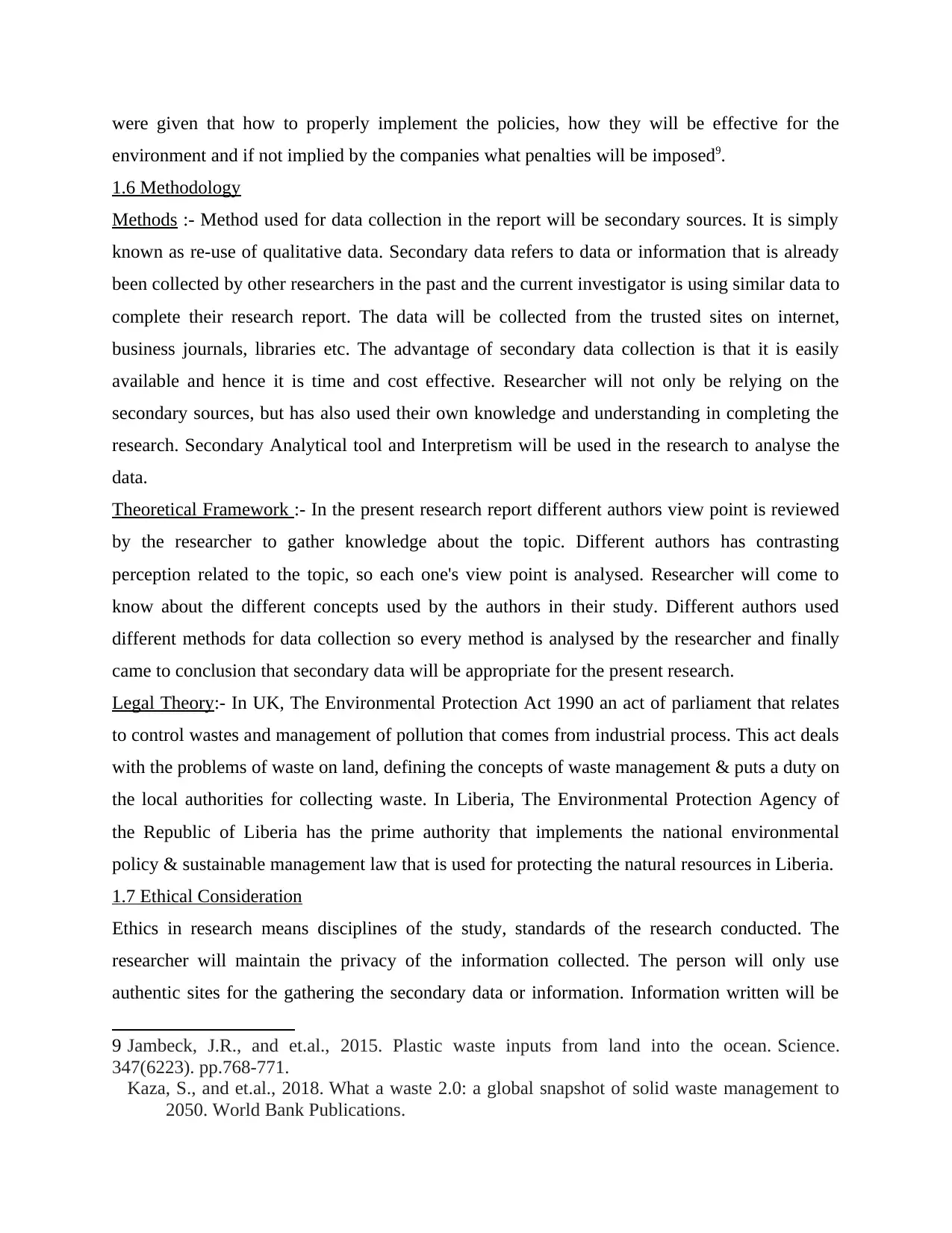
were given that how to properly implement the policies, how they will be effective for the
environment and if not implied by the companies what penalties will be imposed9.
1.6 Methodology
Methods :- Method used for data collection in the report will be secondary sources. It is simply
known as re-use of qualitative data. Secondary data refers to data or information that is already
been collected by other researchers in the past and the current investigator is using similar data to
complete their research report. The data will be collected from the trusted sites on internet,
business journals, libraries etc. The advantage of secondary data collection is that it is easily
available and hence it is time and cost effective. Researcher will not only be relying on the
secondary sources, but has also used their own knowledge and understanding in completing the
research. Secondary Analytical tool and Interpretism will be used in the research to analyse the
data.
Theoretical Framework :- In the present research report different authors view point is reviewed
by the researcher to gather knowledge about the topic. Different authors has contrasting
perception related to the topic, so each one's view point is analysed. Researcher will come to
know about the different concepts used by the authors in their study. Different authors used
different methods for data collection so every method is analysed by the researcher and finally
came to conclusion that secondary data will be appropriate for the present research.
Legal Theory:- In UK, The Environmental Protection Act 1990 an act of parliament that relates
to control wastes and management of pollution that comes from industrial process. This act deals
with the problems of waste on land, defining the concepts of waste management & puts a duty on
the local authorities for collecting waste. In Liberia, The Environmental Protection Agency of
the Republic of Liberia has the prime authority that implements the national environmental
policy & sustainable management law that is used for protecting the natural resources in Liberia.
1.7 Ethical Consideration
Ethics in research means disciplines of the study, standards of the research conducted. The
researcher will maintain the privacy of the information collected. The person will only use
authentic sites for the gathering the secondary data or information. Information written will be
9 Jambeck, J.R., and et.al., 2015. Plastic waste inputs from land into the ocean. Science.
347(6223). pp.768-771.
Kaza, S., and et.al., 2018. What a waste 2.0: a global snapshot of solid waste management to
2050. World Bank Publications.
environment and if not implied by the companies what penalties will be imposed9.
1.6 Methodology
Methods :- Method used for data collection in the report will be secondary sources. It is simply
known as re-use of qualitative data. Secondary data refers to data or information that is already
been collected by other researchers in the past and the current investigator is using similar data to
complete their research report. The data will be collected from the trusted sites on internet,
business journals, libraries etc. The advantage of secondary data collection is that it is easily
available and hence it is time and cost effective. Researcher will not only be relying on the
secondary sources, but has also used their own knowledge and understanding in completing the
research. Secondary Analytical tool and Interpretism will be used in the research to analyse the
data.
Theoretical Framework :- In the present research report different authors view point is reviewed
by the researcher to gather knowledge about the topic. Different authors has contrasting
perception related to the topic, so each one's view point is analysed. Researcher will come to
know about the different concepts used by the authors in their study. Different authors used
different methods for data collection so every method is analysed by the researcher and finally
came to conclusion that secondary data will be appropriate for the present research.
Legal Theory:- In UK, The Environmental Protection Act 1990 an act of parliament that relates
to control wastes and management of pollution that comes from industrial process. This act deals
with the problems of waste on land, defining the concepts of waste management & puts a duty on
the local authorities for collecting waste. In Liberia, The Environmental Protection Agency of
the Republic of Liberia has the prime authority that implements the national environmental
policy & sustainable management law that is used for protecting the natural resources in Liberia.
1.7 Ethical Consideration
Ethics in research means disciplines of the study, standards of the research conducted. The
researcher will maintain the privacy of the information collected. The person will only use
authentic sites for the gathering the secondary data or information. Information written will be
9 Jambeck, J.R., and et.al., 2015. Plastic waste inputs from land into the ocean. Science.
347(6223). pp.768-771.
Kaza, S., and et.al., 2018. What a waste 2.0: a global snapshot of solid waste management to
2050. World Bank Publications.
⊘ This is a preview!⊘
Do you want full access?
Subscribe today to unlock all pages.

Trusted by 1+ million students worldwide
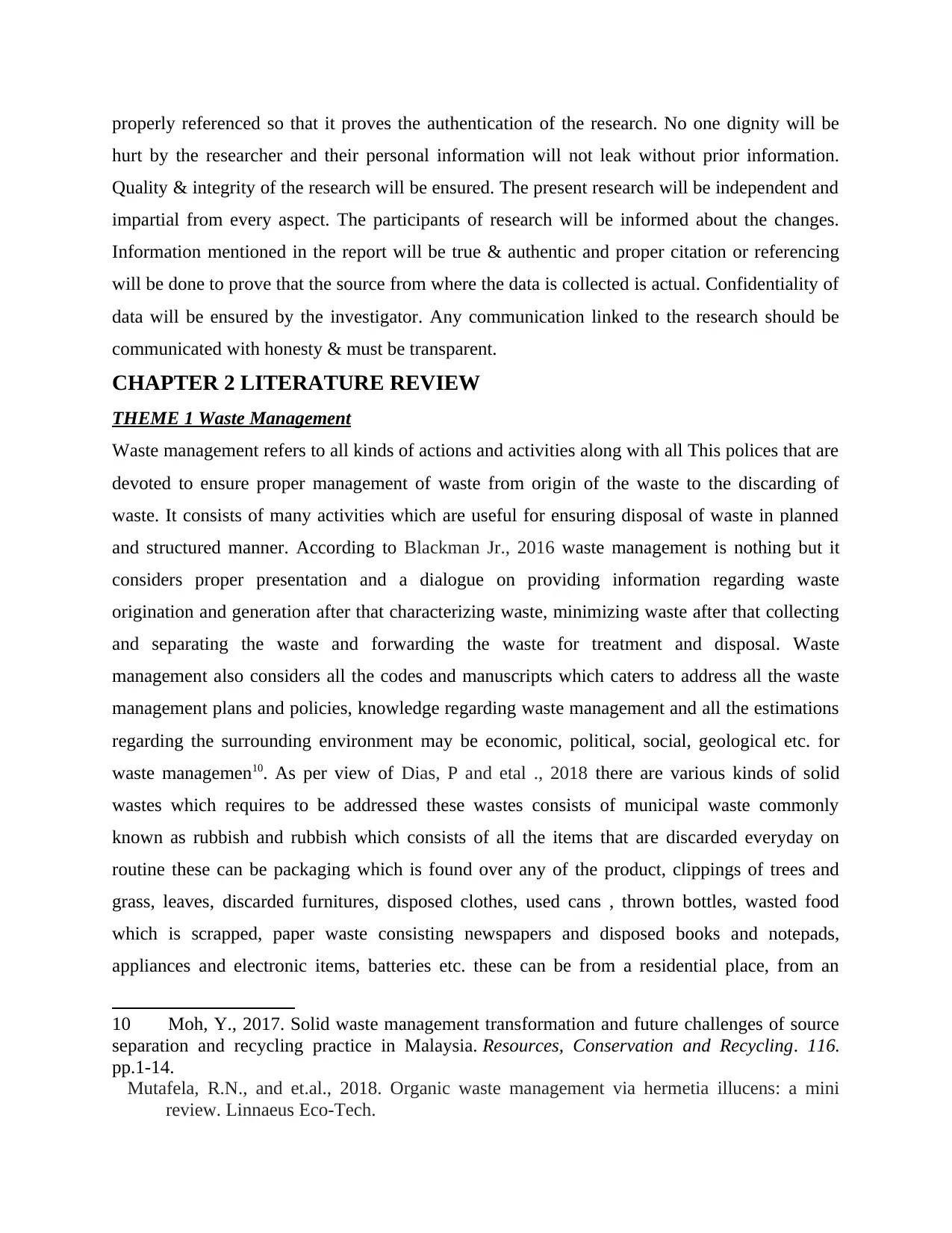
properly referenced so that it proves the authentication of the research. No one dignity will be
hurt by the researcher and their personal information will not leak without prior information.
Quality & integrity of the research will be ensured. The present research will be independent and
impartial from every aspect. The participants of research will be informed about the changes.
Information mentioned in the report will be true & authentic and proper citation or referencing
will be done to prove that the source from where the data is collected is actual. Confidentiality of
data will be ensured by the investigator. Any communication linked to the research should be
communicated with honesty & must be transparent.
CHAPTER 2 LITERATURE REVIEW
THEME 1 Waste Management
Waste management refers to all kinds of actions and activities along with all This polices that are
devoted to ensure proper management of waste from origin of the waste to the discarding of
waste. It consists of many activities which are useful for ensuring disposal of waste in planned
and structured manner. According to Blackman Jr., 2016 waste management is nothing but it
considers proper presentation and a dialogue on providing information regarding waste
origination and generation after that characterizing waste, minimizing waste after that collecting
and separating the waste and forwarding the waste for treatment and disposal. Waste
management also considers all the codes and manuscripts which caters to address all the waste
management plans and policies, knowledge regarding waste management and all the estimations
regarding the surrounding environment may be economic, political, social, geological etc. for
waste managemen10. As per view of Dias, P and etal ., 2018 there are various kinds of solid
wastes which requires to be addressed these wastes consists of municipal waste commonly
known as rubbish and rubbish which consists of all the items that are discarded everyday on
routine these can be packaging which is found over any of the product, clippings of trees and
grass, leaves, discarded furnitures, disposed clothes, used cans , thrown bottles, wasted food
which is scrapped, paper waste consisting newspapers and disposed books and notepads,
appliances and electronic items, batteries etc. these can be from a residential place, from an
10 Moh, Y., 2017. Solid waste management transformation and future challenges of source
separation and recycling practice in Malaysia. Resources, Conservation and Recycling. 116.
pp.1-14.
Mutafela, R.N., and et.al., 2018. Organic waste management via hermetia illucens: a mini
review. Linnaeus Eco-Tech.
hurt by the researcher and their personal information will not leak without prior information.
Quality & integrity of the research will be ensured. The present research will be independent and
impartial from every aspect. The participants of research will be informed about the changes.
Information mentioned in the report will be true & authentic and proper citation or referencing
will be done to prove that the source from where the data is collected is actual. Confidentiality of
data will be ensured by the investigator. Any communication linked to the research should be
communicated with honesty & must be transparent.
CHAPTER 2 LITERATURE REVIEW
THEME 1 Waste Management
Waste management refers to all kinds of actions and activities along with all This polices that are
devoted to ensure proper management of waste from origin of the waste to the discarding of
waste. It consists of many activities which are useful for ensuring disposal of waste in planned
and structured manner. According to Blackman Jr., 2016 waste management is nothing but it
considers proper presentation and a dialogue on providing information regarding waste
origination and generation after that characterizing waste, minimizing waste after that collecting
and separating the waste and forwarding the waste for treatment and disposal. Waste
management also considers all the codes and manuscripts which caters to address all the waste
management plans and policies, knowledge regarding waste management and all the estimations
regarding the surrounding environment may be economic, political, social, geological etc. for
waste managemen10. As per view of Dias, P and etal ., 2018 there are various kinds of solid
wastes which requires to be addressed these wastes consists of municipal waste commonly
known as rubbish and rubbish which consists of all the items that are discarded everyday on
routine these can be packaging which is found over any of the product, clippings of trees and
grass, leaves, discarded furnitures, disposed clothes, used cans , thrown bottles, wasted food
which is scrapped, paper waste consisting newspapers and disposed books and notepads,
appliances and electronic items, batteries etc. these can be from a residential place, from an
10 Moh, Y., 2017. Solid waste management transformation and future challenges of source
separation and recycling practice in Malaysia. Resources, Conservation and Recycling. 116.
pp.1-14.
Mutafela, R.N., and et.al., 2018. Organic waste management via hermetia illucens: a mini
review. Linnaeus Eco-Tech.
Paraphrase This Document
Need a fresh take? Get an instant paraphrase of this document with our AI Paraphraser
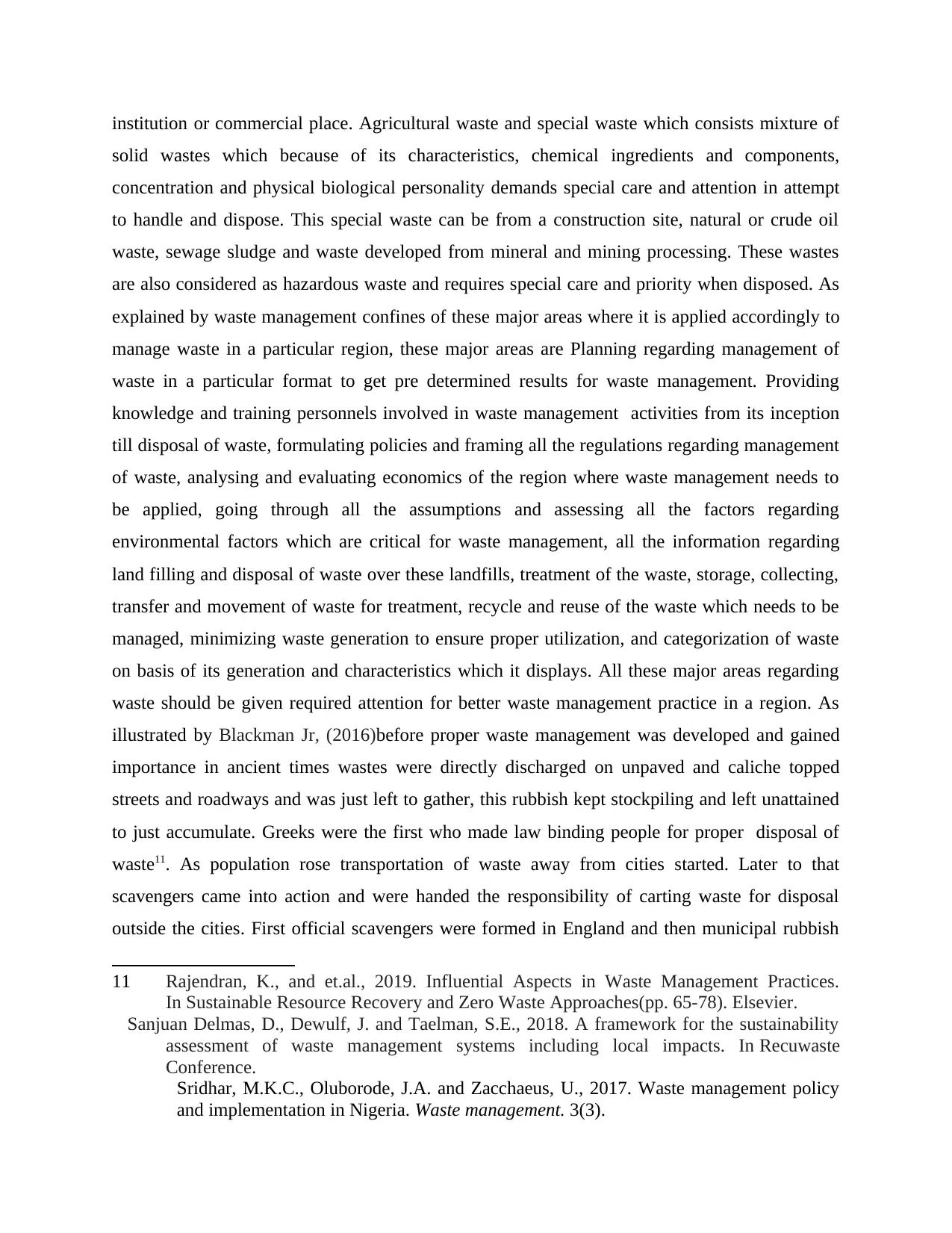
institution or commercial place. Agricultural waste and special waste which consists mixture of
solid wastes which because of its characteristics, chemical ingredients and components,
concentration and physical biological personality demands special care and attention in attempt
to handle and dispose. This special waste can be from a construction site, natural or crude oil
waste, sewage sludge and waste developed from mineral and mining processing. These wastes
are also considered as hazardous waste and requires special care and priority when disposed. As
explained by waste management confines of these major areas where it is applied accordingly to
manage waste in a particular region, these major areas are Planning regarding management of
waste in a particular format to get pre determined results for waste management. Providing
knowledge and training personnels involved in waste management activities from its inception
till disposal of waste, formulating policies and framing all the regulations regarding management
of waste, analysing and evaluating economics of the region where waste management needs to
be applied, going through all the assumptions and assessing all the factors regarding
environmental factors which are critical for waste management, all the information regarding
land filling and disposal of waste over these landfills, treatment of the waste, storage, collecting,
transfer and movement of waste for treatment, recycle and reuse of the waste which needs to be
managed, minimizing waste generation to ensure proper utilization, and categorization of waste
on basis of its generation and characteristics which it displays. All these major areas regarding
waste should be given required attention for better waste management practice in a region. As
illustrated by Blackman Jr, (2016)before proper waste management was developed and gained
importance in ancient times wastes were directly discharged on unpaved and caliche topped
streets and roadways and was just left to gather, this rubbish kept stockpiling and left unattained
to just accumulate. Greeks were the first who made law binding people for proper disposal of
waste11. As population rose transportation of waste away from cities started. Later to that
scavengers came into action and were handed the responsibility of carting waste for disposal
outside the cities. First official scavengers were formed in England and then municipal rubbish
11 Rajendran, K., and et.al., 2019. Influential Aspects in Waste Management Practices.
In Sustainable Resource Recovery and Zero Waste Approaches(pp. 65-78). Elsevier.
Sanjuan Delmas, D., Dewulf, J. and Taelman, S.E., 2018. A framework for the sustainability
assessment of waste management systems including local impacts. In Recuwaste
Conference.
Sridhar, M.K.C., Oluborode, J.A. and Zacchaeus, U., 2017. Waste management policy
and implementation in Nigeria. Waste management. 3(3).
solid wastes which because of its characteristics, chemical ingredients and components,
concentration and physical biological personality demands special care and attention in attempt
to handle and dispose. This special waste can be from a construction site, natural or crude oil
waste, sewage sludge and waste developed from mineral and mining processing. These wastes
are also considered as hazardous waste and requires special care and priority when disposed. As
explained by waste management confines of these major areas where it is applied accordingly to
manage waste in a particular region, these major areas are Planning regarding management of
waste in a particular format to get pre determined results for waste management. Providing
knowledge and training personnels involved in waste management activities from its inception
till disposal of waste, formulating policies and framing all the regulations regarding management
of waste, analysing and evaluating economics of the region where waste management needs to
be applied, going through all the assumptions and assessing all the factors regarding
environmental factors which are critical for waste management, all the information regarding
land filling and disposal of waste over these landfills, treatment of the waste, storage, collecting,
transfer and movement of waste for treatment, recycle and reuse of the waste which needs to be
managed, minimizing waste generation to ensure proper utilization, and categorization of waste
on basis of its generation and characteristics which it displays. All these major areas regarding
waste should be given required attention for better waste management practice in a region. As
illustrated by Blackman Jr, (2016)before proper waste management was developed and gained
importance in ancient times wastes were directly discharged on unpaved and caliche topped
streets and roadways and was just left to gather, this rubbish kept stockpiling and left unattained
to just accumulate. Greeks were the first who made law binding people for proper disposal of
waste11. As population rose transportation of waste away from cities started. Later to that
scavengers came into action and were handed the responsibility of carting waste for disposal
outside the cities. First official scavengers were formed in England and then municipal rubbish
11 Rajendran, K., and et.al., 2019. Influential Aspects in Waste Management Practices.
In Sustainable Resource Recovery and Zero Waste Approaches(pp. 65-78). Elsevier.
Sanjuan Delmas, D., Dewulf, J. and Taelman, S.E., 2018. A framework for the sustainability
assessment of waste management systems including local impacts. In Recuwaste
Conference.
Sridhar, M.K.C., Oluborode, J.A. and Zacchaeus, U., 2017. Waste management policy
and implementation in Nigeria. Waste management. 3(3).
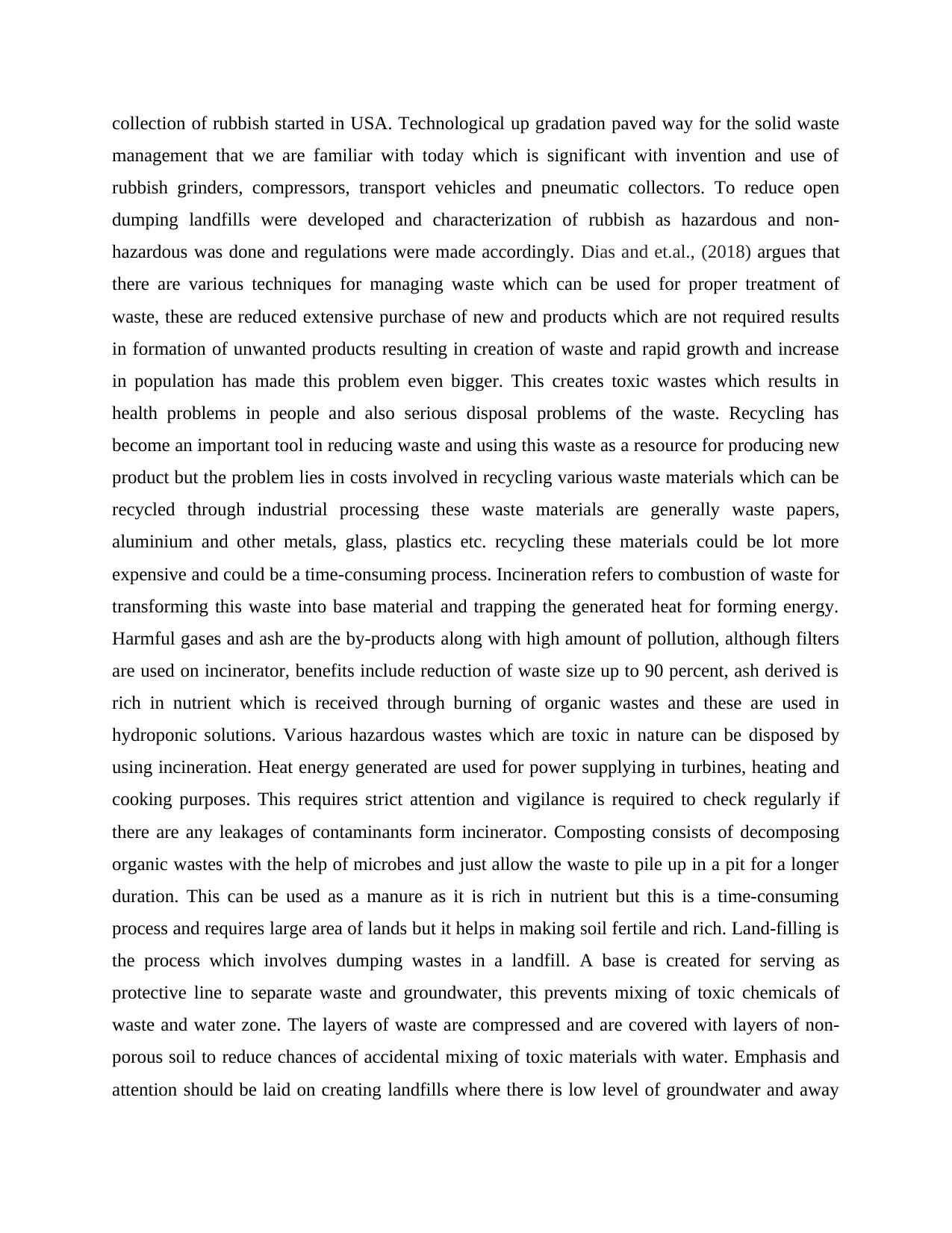
collection of rubbish started in USA. Technological up gradation paved way for the solid waste
management that we are familiar with today which is significant with invention and use of
rubbish grinders, compressors, transport vehicles and pneumatic collectors. To reduce open
dumping landfills were developed and characterization of rubbish as hazardous and non-
hazardous was done and regulations were made accordingly. Dias and et.al., (2018) argues that
there are various techniques for managing waste which can be used for proper treatment of
waste, these are reduced extensive purchase of new and products which are not required results
in formation of unwanted products resulting in creation of waste and rapid growth and increase
in population has made this problem even bigger. This creates toxic wastes which results in
health problems in people and also serious disposal problems of the waste. Recycling has
become an important tool in reducing waste and using this waste as a resource for producing new
product but the problem lies in costs involved in recycling various waste materials which can be
recycled through industrial processing these waste materials are generally waste papers,
aluminium and other metals, glass, plastics etc. recycling these materials could be lot more
expensive and could be a time-consuming process. Incineration refers to combustion of waste for
transforming this waste into base material and trapping the generated heat for forming energy.
Harmful gases and ash are the by-products along with high amount of pollution, although filters
are used on incinerator, benefits include reduction of waste size up to 90 percent, ash derived is
rich in nutrient which is received through burning of organic wastes and these are used in
hydroponic solutions. Various hazardous wastes which are toxic in nature can be disposed by
using incineration. Heat energy generated are used for power supplying in turbines, heating and
cooking purposes. This requires strict attention and vigilance is required to check regularly if
there are any leakages of contaminants form incinerator. Composting consists of decomposing
organic wastes with the help of microbes and just allow the waste to pile up in a pit for a longer
duration. This can be used as a manure as it is rich in nutrient but this is a time-consuming
process and requires large area of lands but it helps in making soil fertile and rich. Land-filling is
the process which involves dumping wastes in a landfill. A base is created for serving as
protective line to separate waste and groundwater, this prevents mixing of toxic chemicals of
waste and water zone. The layers of waste are compressed and are covered with layers of non-
porous soil to reduce chances of accidental mixing of toxic materials with water. Emphasis and
attention should be laid on creating landfills where there is low level of groundwater and away
management that we are familiar with today which is significant with invention and use of
rubbish grinders, compressors, transport vehicles and pneumatic collectors. To reduce open
dumping landfills were developed and characterization of rubbish as hazardous and non-
hazardous was done and regulations were made accordingly. Dias and et.al., (2018) argues that
there are various techniques for managing waste which can be used for proper treatment of
waste, these are reduced extensive purchase of new and products which are not required results
in formation of unwanted products resulting in creation of waste and rapid growth and increase
in population has made this problem even bigger. This creates toxic wastes which results in
health problems in people and also serious disposal problems of the waste. Recycling has
become an important tool in reducing waste and using this waste as a resource for producing new
product but the problem lies in costs involved in recycling various waste materials which can be
recycled through industrial processing these waste materials are generally waste papers,
aluminium and other metals, glass, plastics etc. recycling these materials could be lot more
expensive and could be a time-consuming process. Incineration refers to combustion of waste for
transforming this waste into base material and trapping the generated heat for forming energy.
Harmful gases and ash are the by-products along with high amount of pollution, although filters
are used on incinerator, benefits include reduction of waste size up to 90 percent, ash derived is
rich in nutrient which is received through burning of organic wastes and these are used in
hydroponic solutions. Various hazardous wastes which are toxic in nature can be disposed by
using incineration. Heat energy generated are used for power supplying in turbines, heating and
cooking purposes. This requires strict attention and vigilance is required to check regularly if
there are any leakages of contaminants form incinerator. Composting consists of decomposing
organic wastes with the help of microbes and just allow the waste to pile up in a pit for a longer
duration. This can be used as a manure as it is rich in nutrient but this is a time-consuming
process and requires large area of lands but it helps in making soil fertile and rich. Land-filling is
the process which involves dumping wastes in a landfill. A base is created for serving as
protective line to separate waste and groundwater, this prevents mixing of toxic chemicals of
waste and water zone. The layers of waste are compressed and are covered with layers of non-
porous soil to reduce chances of accidental mixing of toxic materials with water. Emphasis and
attention should be laid on creating landfills where there is low level of groundwater and away
⊘ This is a preview!⊘
Do you want full access?
Subscribe today to unlock all pages.

Trusted by 1+ million students worldwide
1 out of 35
Related Documents
Your All-in-One AI-Powered Toolkit for Academic Success.
+13062052269
info@desklib.com
Available 24*7 on WhatsApp / Email
![[object Object]](/_next/static/media/star-bottom.7253800d.svg)
Unlock your academic potential
Copyright © 2020–2026 A2Z Services. All Rights Reserved. Developed and managed by ZUCOL.





